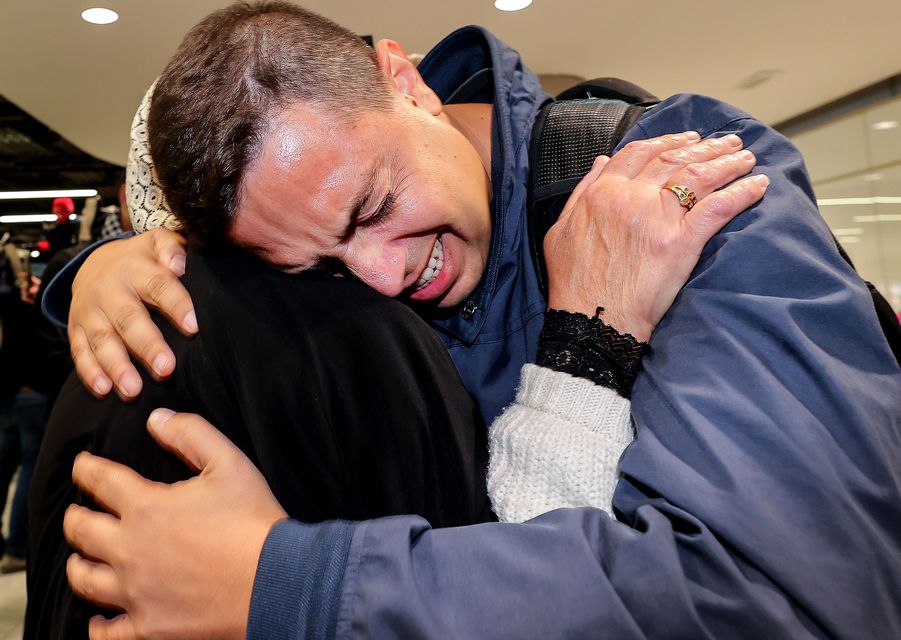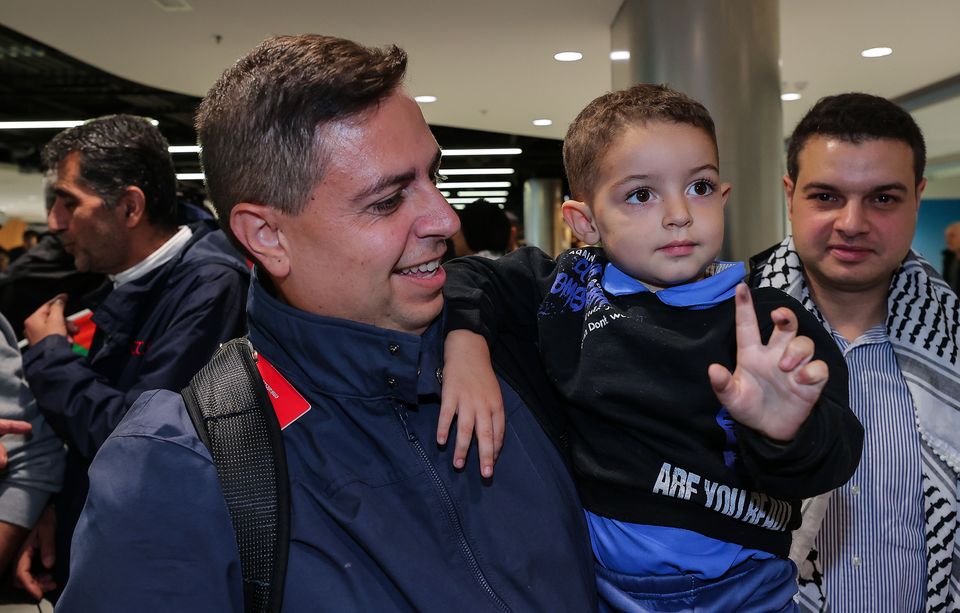‘Am I allowed to drink more?’ – Ibrahim Alagha shares heartbreaking moment his son was given water after getting out of Gaza

[ad_1]
Mr Alagha, from Blanchardstown, shared updates of daily life as the family were trapped for 40 days under Israeli bombardment was speaking in an interview with Virgin Media Television at home with his wife Hamida, and their three young children Sami, Omar and Eileen.
He thanked the Irish public for their support and for lobbying politicians to get Irish citizens out of Gaza.
Mr Alagha tearfully recalled the moment his family finally passed through the Rafah Crossing into Egypt, where they were met by an Irish diplomat who gave them food and water after rationing food and water for weeks.
Ibrahim Alagha who escaped from Gaza in the comforting arms of his mother Marwa after he arrived in Dublin Airport . Picture; Gerry Mooney
Mr Alagha said: “There was this moment that touched my heart… I gave my son water to drink. He drank it and he asked me ‘am I allowed to drink more?’ because there were rules in the house, he was not allowed to drink more than a small bit. He asked me could he drink more, I said ‘of course, drink as much as you want’. That moment. Oh my god.”
The family were among about 30 people who returned from Gaza on a flight from Egypt to Dublin on Saturday evening. They were among 90 people sheltering in his parents’ farmhouse in the southern Gazan city of Khan Younis.
Speaking about whether he thought his family would survive the war, Mr Alagha added: “A lot of nights, especially the days when communications were cut off and Khan Younis were heavily targeted, honestly I was thinking I would never make it to the next day. There’s some prayers that we say, I used to say them every single night. I used to get all my family hugging each other and staying together. The feeling was that we either die together or live together. That was very important to me. I wanted all of us to be together.”
And speaking about the impact of the war on his children: “My son Sami is the most affected. We call it ‘scare shocks’. Some nights he [Sami, 8] was crying, he had a lot of nightmares… Usually, when there are a lot of bombings, we open the window a little bit so it doesn’t break the windows. He saw that and got really scared of windows. He will always stay away from windows. Always. There was a story about a house that was beside an air-strike target. The main door was jammed. There was a fire and they couldn’t get out of the house. He was obsessed with keeping the door open. If we closed the door, he’d say ‘no! no!'”
Ibrahim Alagha and his son Omar who escaped from Gaza after they arrived in Dublin Airport. Picture: Gerry Mooney
Mr Alagha said the experience has been the strangest of his life.
“The last couple of days, I think, is the strangest thing that could happen to anyone,” he said “Being in a situation where you feel you’re going to be killed at any time. You don’t have water, you don’t have food, nothing… Now we are here in Ireland. The love that I saw from the people and the demonstration with all the people showing up. Amazing, amazing feeling. This is a week I’m never going to forget in my life.”
And he thanked the Irish people for their support and keeping up pressure to get Irish citizens home safely.
“It’s really nice to feel the love of people towards you. People that we never knew, even if we met on the street, we might not know each other,” he said. “But knowing that people care. That’s a really nice feeling. I really wish I could thank every one of them. I think without their support, we maybe wouldn’t have seen this day happening… There was a lot of pressure, and I felt that, from all sides about us people in Gaza. I think it pushed the Government to put all its weight in to try and do that. Thank God it did.”
However, he has fears for his loved ones left behind.
“We’re really happy we’re out. But on the other side, there are a lot of people I know I’m not going to see again,” he said. “A lot of them. When we were saying goodbye to each other, we didn’t talk but we looked at each other. I felt there was a connection… a lot of words going between our eyes. I had this feeling that they were wishing they could be in our position; or that I could do anything for them when I’m out to take them out of this too… Every day I wake up and I see new people killed. Some of them I just saw days before the war. Some people I had daily contact with, just passing away. It’s this feeling whenever you see someone (in Gaza): ‘am I going to see him again?’… If I see someone, I might just say goodbye to him because I might not see him again.”
[ad_2]

